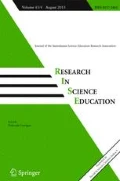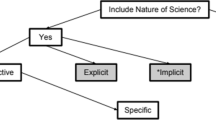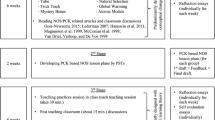Abstract
This study investigated what 13 secondary science teachers at various nature of science (NOS) instruction implementation levels talked about when they reflected on their teaching. We then determined if differences exist in the quality of those reflections between high, medium, and low NOS implementers. This study sought to answer the following questions: (1) What do teachers talk about when asked general questions about their pedagogy and NOS pedagogy and (2) what qualitative differences, if any, exist within variables across teachers of varying NOS implementation levels? Evidence derived from these teachers’ reflections indicated that self-efficacy and perceptions of general importance for NOS instruction were poor indicators of NOS implementation. However, several factors were associated with the extent that these teachers implemented NOS instruction, including the utility value they hold for NOS teaching, considerations of how people learn, understanding of NOS pedagogy, and their ability to accurately and deeply self-reflect about teaching. Notably, those teachers who effectively implemented the NOS at higher levels value NOS instruction for reasons that transcend immediate instructional objectives. That is, they value teaching NOS for achieving compelling ends realized long after formal schooling (e.g., lifelong socioscientific decision-making for civic reasons), and they deeply reflect about how to teach NOS by drawing from research about how people learn. Low NOS implementers’ simplistic notions and reflections about teaching and learning appeared to be impeding factors to accurate and consistent NOS implementation. This study has implications for science teacher education efforts that promote NOS instruction.
Similar content being viewed by others
References
Abd-El-Khalick, F., & Lederman, N. G. (2000). Improving science teachers’ conceptions of nature of science: a critical review of the literature. International Journal of Science Education, 22(7), 665–701.
Abd-El-Khalick, F., Bell, R. L., & Lederman, N. G. (1998). The nature of science and instructional practice: making the unnatural natural. Science Education, 82(4), 417–436.
Abell, S., Bryan, L., & Anderson, M. A. (1998). Investigating preservice elementary science teacher reflective thinking using integrated media case-based instruction in elementary science teacher preparation. Science Education, 82(4), 491–510.
Appleton, K. (2006). Science pedagogical content knowledge and elementary school teachers. In K. Appleton (Ed.), Elementary science teacher education: international perspectives on contemporary issues and practice (pp. 31–54). New Jersey: Lawrence Erlbaum.
Arya, D. J., & Maul, A. (2012). The role of the scientific discovery narrative in middle school science education: an experimental study. Journal of Educational Psychology, 104(4), 1022–1032.
Backhus, D. A., & Thompson, K. W. (2006). Addressing the nature of science in preservice science teacher preparation programs: science educator perceptions. Journal of Science Teacher Education, 17(1), 65–81.
Bell, R. L., Lederman, N. G., & Abd-El-Khalick, F. (2000). Developing and acting upon one’s conception of science: a follow-up study. Journal of Research in Science Teaching, 37(6), 563–581.
Bransford, J., Brown, A., & Cocking, R. (2000). How people learn: brain, mind, and experience & school. Washington: National Academy Press.
Brickhouse, N. W., & Bodner, G. M. (1992). The beginning science teacher: classroom narratives of convictions and constraints. Journal of Research in Science Teaching, 29(5), 471–485.
Brickhouse, N. W., Dagher, Z. R., Letts, W. J., & Shipman, H. L. (2000). Diversity of students’ views about evidence, theory, and the interface between science and religion in an astronomy course. Journal of Research in Science Teaching, 37(4), 340–362.
Clark, R. E. (1997). The CANE model of motivation to learn and to work: a two-stage process of goal commitment and effort. Belgium: Paper presented at the University of Leuven.
Clough, M. P. (1998). Integrating the nature of science with student teaching: rationales and strategies. In W. F. McComas (Ed.), The nature of science in science education: rationales and strategies. Dordrecht: Kluwer. Chapter 11.
Clough, M. P. (2006). Learners’ responses to the demands of conceptual change: considerations for effective nature of science instruction. Science Education, 15(5), 463–494.
Clough, M. P. (2007). Teaching the nature of science to secondary and post-secondary students: questions rather than tenets, the pantaneto forum, 25. California Journal of Science Education, 8(2), 31–40. http://www.pantaneto.co.uk/issue25/front25.htm , January. Republished (2008).
Clough, M. P. (2011). Teaching and assessing the nature of science: how to effectively incorporate the nature of science in your classroom. The Science Teacher, 78(6), 56–60.
Clough, M. P., Berg, C. A., & Olson, J. K. (2009). Promoting effective science teacher education and science teaching: a framework for teacher decision-making. International Journal of Science and Mathematics Education, 7(4), 821–847.
Cochan-Smith, M. & Zeichner, K. M. (2005). Studying teacher education: the report of the AERA panel on research and teacher education. Mahwah, NJ.
Cromer, A. (1993). Uncommon sense: the heretical nature of science. New York: Oxford University Press.
Dewey, J. (1929). The sources of a science of education. New York: Horace Liveright.
Driver, R., Leach, J., Millar, R., & Scott, P. (1996). Young people’s images of science. Buckingham: Open University Press.
Duschl, R. A., & Wright, E. (1989). A case study of high school teachers’ decision making models for planning and teaching science. Journal of Research in Science Teaching, 26(6), 467–501.
Herman, B. C. (2015). The Influence of global warming science views and sociocultural factors on willingness to mitigate global warming. Science Education, 1(1), 1–38.
Herman, B. C., & Clough, M. P. (2014). Teachers’ longitudinal NOS understanding after having completed a science teacher education program. International Journal of Science and Mathematics Education. Advance online publication. doi:10.1007/s10763-014-9594-1.
Herman, B. C., Clough, M. P., & Olson, J. K. (2013a). Teachers’ NOS implementation practices 2 to 5 years after having completed an intensive science education program. Science Education, 97(2), 271–309.
Herman, B. C., Clough, M. P., & Olson, J. K. (2013b). Association between experienced teachers’ NOS implementation and general reform-based science teaching practices (GRBSTP). Journal of Science Teacher Education, 24(7), 1077–1102.
Hodson, D. (1993). Philosophic stance of secondary school science teachers, curriculum experiences, and children’s understanding of science: some preliminary findings. Interchange, 24(1–2), 41–52.
Hong, H., & Lin-Siegler, X. (2012). How learning about scientists’ struggles influences students’ interest and learning in physics. Journal of Educational Psychology, 104(2), 469–484.
Khishfe, R., & Abd-El-Khalick, F. (2002). Influence of explicit and reflective versus implicit inquiry oriented instruction on sixth graders views of the nature of science. Journal of Research in Science Teaching, 30(7), 551–578.
Khishfe, R., & Lederman, N. (2006). Teaching nature of science within a controversial topic: integrated versus nonintegrated. Journal of Research in Science Teaching, 43(4), 395–418.
King, B. (1991). Beginning teachers’ knowledge of and attitude toward history and philosophy of science. Science Education, 75(1), 135–141.
Kruger, J., & Dunning, D. (1999). Unskilled & unaware of it: how difficulties in recognizing one’s own incompetence lead to inflated self-assessments. Journal of Personality and Social Psychology, 77(6), 1121–1134.
Lakin, S., & Wellington, J. (1994). Who will teach the nature of science?: teachers’ views of science and their implications for science education. International Journal of Science Education, 16(2), 175–190.
Lantz, O., & Kass, H. (1987). Chemistry teachers’ functional paradigms. Science Education, 71(1), 117–134.
Lederman, N. G. (1999). Teachers’ understanding of the nature of science and classroom practice: factors that facilitate or impede the relationship. Journal of Research in Science Teaching, 36(8), 916–929.
Lederman, N. G. (2006). Syntax of nature of science within inquiry and science instruction. In L. B. Flick & N. G. Lederman (Eds.), Scientific inquiry and nature of science: implications for teaching, learning, and teacher education (chap. 14). Dordrecht: Springer.
Lederman, N. G. (2007). Nature of science: past, present, and future. In S. K. Abell & N. G. Lederman (Eds.), Handbook of research on science education (pp. 831–880). Mahwah: Lawrence Erlbaum Associates.
Lincoln, Y. S., & Guba, E. G. (1985). Naturalistic inquiry. Beverly Hills: Sage.
Madsen, A. J. (2005). Where is the “self” in teacher self-assessment? An examination of teachers’ reflection and assessment practices in relation to their teaching practices. Ames, Iowa: Iowa State University.
Matthews, M. (1994). Science teaching: the role of history and philosophy of science. New York: Routledge.
Maxwell, J. A. (2005). Qualitative research design: an interactive approach. Thousand Oaks: Sage Press.
Miles, M. A., & Huberman, A. M. (1994). Qualitative data analysis: an expanded sourcebook. Thousand Oaks: Sage.
Mitchell, S. D. (2009). Unsimple truths: science, complexity, and policy. Chicago: University of Chicago Press.
Pinker, S. (1997). How the mind works (pp. 302–306). New York: W.W. Norton & Company.
Pintrich, P. R., & Schunk, D. H. (1996). Motivation in education: theory, research and applications. Englewood Cliffs: Prentice Hall.
Postman, N. (1995). The end of education. New York: Vintage Books.
Robinson, J. T. (1968). The nature of science and science teaching. Wadsworth: Belmont.
Rudolph, J. L. (2007). An inconvenient truth about science education. Teachers College Record, http://www.tcrecord.org, ID Number: 13216, Date Accessed: 11/5/2011.
Sadler, T. D. (2004). Informal reasoning regarding socioscientific issues: a critical review of research. Journal of Research in Science Teaching, 41(5), 513–536.
Schwartz, R. S., & Lederman, N. G. (2002). It’s the nature of the beast: the influence of knowledge and intentions on learning and teaching the nature of science. Journal of Research in Science Teaching, 39(3), 205–236.
Toulmin, S. (1972). Human understanding: an inquiry into the aims of science. Princeton University Press: Princeton.
Author information
Authors and Affiliations
Corresponding author
Rights and permissions
About this article
Cite this article
Herman, B.C., Clough, M.P. & Olson, J.K. Pedagogical Reflections by Secondary Science Teachers at Different NOS Implementation Levels. Res Sci Educ 47, 161–184 (2017). https://doi.org/10.1007/s11165-015-9494-6
Published:
Issue Date:
DOI: https://doi.org/10.1007/s11165-015-9494-6




